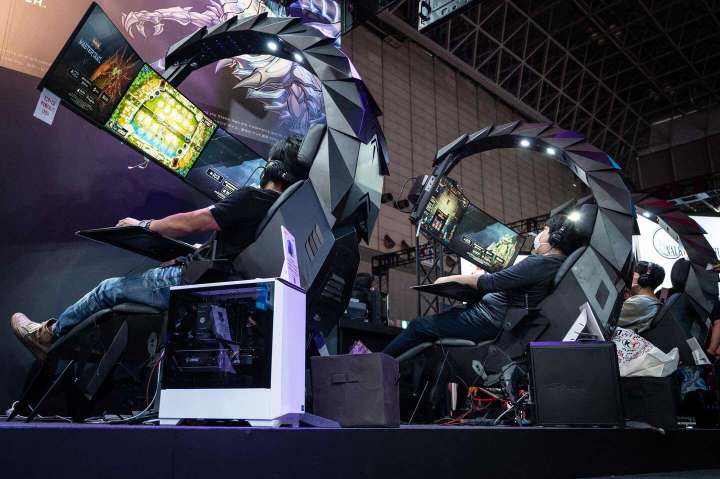Fans of video games should pay heed to the fate of big Hollywood studios — which first ceded creative control to Chinese censors in pursuit of box-office gold and then found themselves floundering when China largely closed its borders to Hollywood products — as China’s government-allied businesses acquire a larger stake in the global gaming industry.
China is coming for video games. Companies and players should be wary.

It makes sense that the Chinese Communist Party (CCP) and its business affiliates would set their sights on video games. The overall size of the gaming market dwarfs that of the global box office.
The largest player in this space is Tencent, “the world’s biggest game company.” The company’s first big purchase was Riot — best known at the time for “League of Legends” — and it has expanded steadily ever since. But as the Ringer noted last month, Tencent has been on an acquisition spree in recent years, gobbling up companies.
“In 2019, it invested in 10 game companies; in 2020, 32; and then, in 2021, the number exploded to 101,” Lewis Gordon reported. As a result of these purchases, the company generates more than a quarter of its revenue from overseas.
Consolidation is not unique to the video game industry, of course, as anyone who watched Disney’s absorption of 21st Century Fox or Amazon’s purchase of MGM will happily tell you. But there is a qualitative difference between a Swedish firm such as Embracer Group amassing a video game empire and a company under the thumb of the CCP doing the same.
Tencent is by no means a household name in the United States. Still, some Americans might recognize Tencent’s logo as one of the many labels that show up in front of movies. Titles familiar to Americans include the Milla Jovovich-starring “Monster Hunter,” the Arnold Schwarzenegger-starring “Terminator: Dark Fate” and the John Cena-starring “Bumblebee.”
However, if Americans have heard of Tencent, it’s likely because of the massive controversy sparked by the company’s effort to censor American icon Pete “Maverick” Mitchell (Tom Cruise). Tencent was a co-financier of “Top Gun: Maverick,” the legacy sequel that has earned more than $700 million at the domestic box office and more than $1.4 billion worldwide.
But that windfall was put at risk by Tencent’s involvement: When the trailer premiered, red-blooded American audience members howled with outrage that Mav’s iconic bomber jacket had been stripped of patches demonstrating America’s alliances with Taiwan and Japan. Following the hue and cry, the patches were replaced. Somewhere along the way, Tencent bailed from the partnership. This likely cost the company tens of millions in revenue, but it also allowed Tencent and its executives to avoid hassles from a Chinese government working to reassert control over cultural figures and companies that have achieved great prominence.
It was a clarifying incident for American audiences and executives alike, the moment when the frog realized the water crossed over from comfortably warm to boiling. Creeping censorship had left not only obvious topics, such as Tibet, off-limits, but also less obvious topics, such as time travel and ghost stories. The whole American studio system had reoriented itself around chasing Chinese lucre, at great creative cost.
The Chinese are trying to interfere with the artistry of video games in a similar way, as Oliver Holmes noted in the Guardian last year.
“In 2011, the designer at Riot learned of an unwritten rule that no video game can show characters emerging from the ground, as if rising from the dead,” Holmes reported. Game developers couldn’t show bones or skulls. Cults were banned as well. Blood could be black but not a realistic red.
China wants games to be viewed not as an art form to be excelled at but a product to be homogenized; hence the nation’s efforts to bring video games under the sway of the International Organization for Standardization. While the application pertained only to technical specifications, it made clear how China sees gaming as a whole — and other players in the market understood the danger of letting China have its way here. The Swedish Games Industry, a trade group, pushed back hard against this effort; as spokesperson Per Stromback told Foreign Policy: “Video games are art. Regulating them in the same manner as lightbulbs would curtail the creators’ freedom.”
Creative concerns coexist alongside a variety of other worries, from fears that China is propagandizing Western youths via history games and other educational endeavors to concerns that the anti-cheat software used by Riot Games might give Chinese authorities undue access to computers around the world, allowing them to siphon off data.
Unlike the threat to artistic freedom, the reality of which is obvious to any observer of the film industry, some of those fears might be overblown. However, I’m sympathetic to them for the same reason I have no interest in letting TikTok anywhere near my phone: The Chinese government’s commitment to privacy is as nonexistent as its commitment to artistic freedom. Better safe than sorry.






